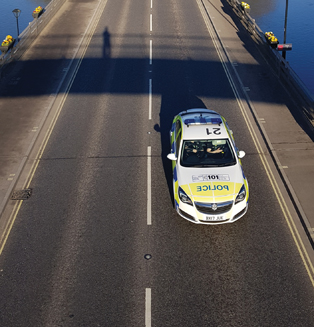Generally, forces were able to find solutions to working during the pandemic lockdown of 2020, says an official report. However Her Majesty’s Inspectorate of Constabulary and Fire and Rescue Services said next to nothing about the number one volume crime of fraud.
(Only a year after the first lockdown of March 2020 has the website home page of the police reporting line Action Fraud take down a notice that it could only offer a reduced service; that despite a general agreement among IT people – and the experience of anyone with a phone or computer – that scams have been rampant.)
The report, ‘Policing in the pandemic‘, threw light on policing regardless of the pandemic. As for ‘prioritising investigations’, the report noted that police forces largely carried on ‘as you were’; ‘decisions are often based on solvability factors, vulnerability and/or assessments of threat, harm and risk’. As for the notorious screening out of many reporting crimes, that the inspectorate has reported on, the report noted that Kent Police have ‘used an algorithm to efficiently target for investigation the most solvable high-volume crime cases, while always considering the public interest’. As the report added, in the polite language of inspectors, this raised ‘concerns about the possible detrimental effect for victims’.
Some routine things such as interviewing witnesses and CCTV collection had to be done differently, the report set out; for example, police took witness statements remotely, usually by ‘phone.
Among bright ideas, Kent Police worked with health services to get fraud prevention messages to the elderly through custom-printed pharmacy bags (one of only three mentions of fraud in a 78-page report) and West Yorkshire Police worked with postal staff and other delivery vehicle drivers, ‘encouraging them to use professional curiosity to identify potentially vulnerable people, rather than making assumptions or accepting things at face value’.
As for planning for and being resilient through ‘civil contingencies’ such as the pandemic, the report looked at the structure of local resilience forums (LRFs). It reported the opinion of many that LRFs ‘lacked the resilience to address an emergency lasting as long as this pandemic’. As for how police actually worked, the report found a ‘switch to handling contact with the public online’ and much home working by ‘contact centres’, as in other, non-police, lines of work (Gwent Police, for instance, had people answering 101 non-emergency calls from home).
There are limits to remote working for police, however; the report pointed out that the ‘ViSOR dangerous persons database management tool is governed by strict security protocols that are not compatible with remote or home working’. The report itself, covering March to November 2020, was itself carried out remotely and online.
And as for preparing beforehand, the report noted police (like others in the public sector) ‘had not tested preparations for dealing with a pandemic through exercises as they had done for terrorism or weather-related scenarios’. A health-led flu pandemic national exercise had been scheduled in 2019, ‘but was cancelled due to the demands of Brexit planning’.
In a foreword, HMI Matt Parr said that ‘some existing problems in the criminal justice system risk being deepened’, such as court delays and backlogs (reported on separately). Overall the police reacted well to the difficult circumstances, he said.
Comment
For the National Police Chiefs’ Council (NPCC) chair Martin Hewitt said: “This report recognises that the past 12 months has been one of the biggest challenges to face modern policing, and that the service has stepped up and met that challenge head on.
“I’m immensely proud of the way forces across England and Wales have responded to the pandemic. Officers, staff and volunteers have worked very long hours, frequently going above and beyond the call of duty and often putting themselves at great risk, to help keep people safe. I am grateful to every single one of them.
“This report highlights some outstanding examples of where forces have bridged the gap of need in our communities, supporting other agencies or stepping in to provide a service, but of course policing hasn’t been limited to the coronavirus. Officers have still been getting on with the job of tackling criminals, protecting the vulnerable and keeping people safe. We’ve also had to contend with the behaviour of criminals who have sadly used the pandemic as an opportunity to find new ways to prey on the vulnerable members of society.
“Like many other organisations, policing has had to adopt new ways of working and adapt to both following and enforcing new legislation at speed. We haven’t always got things right straight away, and we have sought throughout the pandemic to learn as we go and improve the service we provide.
“As lockdown eases and we start to look towards recovery, we will consider the recommendations from this report as part of this learning, working with our partners across government, law enforcement and the criminal justice system.”
Photo by Mark Rowe; police car on patrol on near empty roads during spring 2020 lockdown.










